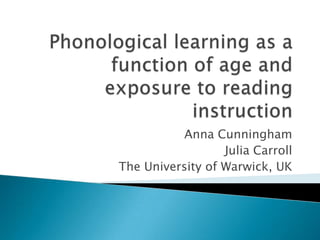
SSSR \'10
- 1. Phonological learning as a function of age and exposure to reading instruction Anna Cunningham Julia Carroll The University of Warwick, UK
- 2. Is a dynamic task more effective than a static task for measuring phoneme awareness in young, beginning readers? Reading instruction stimulates phoneme awareness, but does age also have an effect? Do older children have betterearly literacy skills than their younger peers in the same class? Research questions
- 3. The ability to ‘recognise the internal phonemic structure of spoken words’ Phonemes refer to small units of sounds, usually denoted by one or two letters Very important to initial reading ability Good PA leads to good reading Poor PA associated with reading difficulties Training in PA enhances reading and spelling Phoneme awareness (PA)
- 7. Ensures understanding of instructions
- 8. Better predictor of subsequent literacy than a static measure Phonological learning
- 10. How does one separate the effect of age from that of reading instruction? (cut-off method) Schooling effect Age effect Old K Young 1st Old 1st Age and schooling effects
- 12. 3 group cut-off design (n = 45) Old Receptions (5 years) Young Year 1s (5 years, 2 months) Old Year 1s (5 years, 11 months) Matched on: Standardised vocabulary Home literacy environment Maternal education The current study
- 13. Time 1 Autumn term Age vs. schooling effects Dynamic PA, Static PA (phoneme deletion), word reading, letter-sound knowledge, letter-name knowledge Time 2 Six month follow-up: Measuring predictive power of the dynamic measure Static PA, word reading, spelling, letter-sound knowledge, letter-name knowledge
- 14. Distribution of the dynamic task (Old Receptions)
- 15. Dynamic measure as a predictor Cronbach’s Alpha =.94 High correlations with reading, spelling and letter knowledge.
- 16. Time 1 results: age and schooling effects
- 17. Effect sizes
- 18. Conclusions Yes. Dynamic measure more appropriate than static measure for measuring PA in young children Potential for more widespread use? Yes. Age has an effect on phoneme awareness (measured dynamically) during Year 1. Yes. Older children, on average, have better literacy skills than their younger classmates Caused by an improved ability to learn phonological skills between age 5 and 6? Exacerbated by early school entry age in the UK?
- 19. Bawnmore Infant school All the parents, teachers and children who took part Acknowledgements
Editor's Notes
- Validity – some tasks e.g. oddity and matching tasks can be solved on the basis of global similarity between stimuli, rather than actual awareness of phonemesAncillary task demands: Trouble retaining whole word in working memory or counting soundsUnderstanding instructions, particularly on the deletion tasksFloor effects on those measuring explicit awareness like the deletion and segmentation tasks. Most 4-5 year olds will really struggle with these. It is important to measure PA effectively in order to identify those children who may benefit from intervention. Due to floor effects, predictive power can be affected because variable is not suitable for statistical analysis.
- The difference was that I used non-words instead of real words to prevent use of orthographic information to help solve the task, as many of the year 1 children already had some reading.
- Explain the cut-off method – comparing the oldest and youngest in a year group.
- Maternal education has been shown to correlate highly with the literacy levels of their chlidren
- Important to use a suitably sensitive measure of PA to avoid the potentially erroneous conclusion that young children have no PA.
- Regression on whole sample, then examination of correlations for individual groups; both were of similar significance in the old receptions and young year 1s, dynamic measure more significant in the old year 1s – due to ceiling effects? Dynamic measure contributes unique variance above and beyond static measure in the prediction of reading and spelling.
- Adopting linear step-up procedures to control for false discovery rate p <.093 is significant. Significant age and schooling effects. Larger schooling than age effects. Due to 30 comparisons (14 ANOVAs and 16 pairwise comparisons)
- Schooling effect is consistently higher than age effect. Usually 1 and a half to 2 times larger. Schooling effects are unsurprising given that reading (and PA) are taught at school. What is particularly interesting are the significant age effects found.
- This suggests that there is an age effect present, but that the static measure is not sufficiently sensitive to detect this. Age effect on early literacy skills has implications for assessment and ability groupings to avoid younger children being wrongfully labeled as less able.